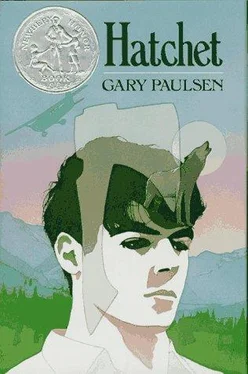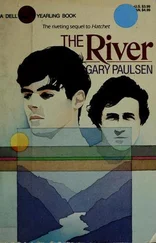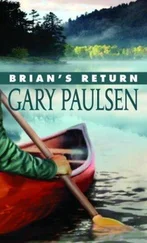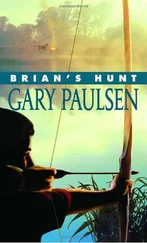Parts of books he'd read about flying came to him. How wings worked, how the propeller pulled the plane through the sky. Simple things that wouldn't help him now.
Nothing could help him now.
An hour passed. He picked up the headset and tried again — it was, he knew, in the end all he had — but there was no answer. He felt like a prisoner, kept in a small cell that was hurtling through the sky at what he thought to be 160 miles an hour, headed — he didn't know where — just headed somewhere until…
There it was. Until what? Until he ran out of fuel. When the plane ran out of fuel it would go down.
Period.
Or he could pull the throttle out and make it go down now. He had seen the pilot push the throttle in to increase speed. If he pulled the throttle back out, the engine would slow down and the plane would go down.
Those were his choices. He could wait for the plane to run out of gas and fall or he could push the throttle in and make it happen sooner. If he waited for the plane to run out of fuel he would go farther — but he did not know which way he was moving. When the pilot had jerked he had moved the plane, but Brian could not remember how much or if it had come back to its original course. Since he did not know the original course anyway and could only guess at which display might be the compass — the one reading 342—he did not know where he had been or where he was going, so it didn't make much difference if he went down now or waited.
Everything in him rebelled against stopping the engine and falling now. He had a vague feeling that he was wrong to keep heading as the plane was heading, a feeling that he might be going off in the wrong direction, but he could not bring himself to stop the engine and fall. Now he was safe, or safer than if he went down — the plane was flying, he was still breathing. When the engine stopped he would go down.
So he left the plane running, holding altitude, and kept trying the radio. He worked out a system. Every ten minutes by the small clock built into the dashboard he tried the radio with a simple message: "I need help. Is there anybody listening to me?"
In the times between transmissions he tried to prepare himself for what he knew was coming. When he ran out of fuel the plane would start down. He guessed that without the propeller pulling he would have to push the nose down to keep the plane flying — he thought he may have read that somewhere, or it just came to him. Either way it made sense. He would have to push the nose down to keep flying speed and then, just before he hit, he would have to pull the nose back up to slow the plane as much as possible.
It all made sense. Glide down, then slow the plane and hit.
Hit.
He would have to find a clearing as he went down. The problem with that was he hadn't seen one clearing since they'd started flying over the forest. Some swamps, but they had trees scattered through them. No roads, no trails, no clearings.
Just the lakes, and it came to him that he would have to use a lake for landing. If he went down in the trees he was certain to die. The trees would tear the plane to pieces as it went into them.
He would have to come down in a lake. No. On the edge of a lake. He would have to come down near the edge of a lake and try to slow the plane as much as possible just before he hit the water.
Easy to say, he thought, hard to do.
Easy say, hard do. Easy say, hard do. It became a chant that beat with the engine. Easy say, hard do.
Impossible to do.
He repeated the radio call seventeen times at the ten-minute intervals, working on what he would do between transmissions. Once more he reached over to the pilot and touched him on the face, but the skin was cold, hard cold, death cold, and Brian turned back to the dashboard. He did what he could, tightened his seatbelt, positioned himself, rehearsed mentally again and again what his procedure should be.
When the plane ran out of gas he should hold the nose down and head for the nearest lake and try to fly the plane kind of onto the water. That's how he thought of it. Kind of fly the plane onto the water. And just before it hit he should pull back on the wheel and slow the plane down to reduce the impact.
Over and over his mind ran the picture of how it would go. The plane running out of gas, flying the plane onto the water, the crash — from pictures he'd seen on television. He tried to visualize it. He tried to be ready.
But between the seventeenth and eighteenth radio transmissions, without a warning, the engine coughed, roared violently for a second and died. There was sudden silence, cut only by the sound of the wind milling propeller and the wind past the cockpit.
Brian pushed the nose of the plane down and threw up.
GOING TO DIE, Brian thought. Going to die, gonna die, gonna die — his whole brain screamed it in the sudden silence.
Gonna die.
He wiped his mouth with the back of his arm and held the nose down. The plane went into a glide, a very fast glide that ate altitude, and suddenly there weren't any lakes. All he'd seen since they started flying over the forest was lakes and now they were gone. Gone. Out in front, far away at the horizon, he could see lots of them, off to the right and left more of them, glittering blue in the late afternoon sun.
But he needed one right in front. He desperately needed a lake right in front of the plane and all he saw through the windshield were trees, green death trees. If he had to turn — if he had to turn he didn't think he could keep the plane flying. His stomach tightened into a series of rolling knots and his breath came in short bursts…
There!
Not quite in front but slightly to the right he saw a lake. L-shaped, with rounded corners, and the plane was nearly aimed at the long part of the L, coming from the bottom and heading to the top. Just a tiny bit to the right. He pushed the right rudder pedal gently and the nose moved over.
But the turn cost him speed and now the lake was above the nose. He pulled back on the wheel slightly and the nose came up. This caused the plane to slow dramatically and almost seem to stop and wallow in the air. The controls became very loose-feeling and frightened Brian, making him push the wheel back in. This increased the speed a bit but filled the windshield once more with nothing but trees, and put the lake well above the nose and out of reach.
For a space of three or four seconds things seemed to hang, almost to stop. The plane was flying, but so slowly, so slowly… it would never reach the lake. Brian looked out to the side and saw a small pond and at the edge of the pond some large animal — he thought a moose — standing out in the water. All so still looking, so stopped, the pond and the moose and the trees, as he slid over them now only three or four hundred feet off the ground — all like a picture.
Then everything happened at once. Trees suddenly took on detail, filled his whole field of vision with green, and he knew he would hit and die, would die, but his luck held and just as he was to hit he came into an open lane, a channel of (alien trees, a wide place leading to the lake.
The plane, committed now to landing, to crashing, fell into the wide place like a stone, and Brian eased back on the wheel and braced himself for the crash. But there was a tiny bit of speed left and when he pulled on the wheel the nose came up and he saw in front the blue of the lake and at that instant the plane hit the trees.
There was a great wrenching as the wings caught the pines at the side of the clearing and broke back, ripping back just outside the main braces. Dust and dirt blew off the floor into his face so hard he thought there must have been some kind of explosion. He was momentarily blinded and slammed forward in the seat, smashing his head on the wheel.
Читать дальше












